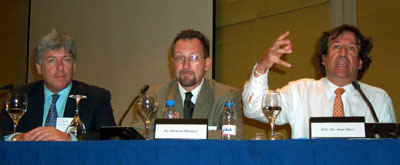 Sustainable Developments
Sustainable Developments |
|
|
Wednesday, 4 October The Second Session of the IUCN World Conservation Congress was officially opened at an evening ceremony on Wednesday, 4 October, in Amman, Jordan. More than 2,000 individuals from 140 countries representing governments, UN agencies, NGOs and the private sector are expected to participate in the Congress, which will convene through 11 October to address the theme of "Ecospace." The opening of the Congress was proceeded by the first Earth Forum, a day long meeting co-hosted by the Earth Council and IUCN which brought together experts to debate "Where are we going? Prospects for the earth in the new millennium." |
|
|
|
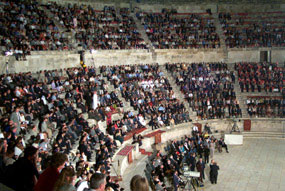 |
OPENING CEREMONY Left: Participants waiting for the Opening Ceremony to begin in the magnificent 2000 year-old Roman amphitheatre in Amman. |
| Mohammad Halaikah, Deputy Prime Minister of Jordan, championed IUCN's debt for nature initiative and emphasized IUCN's advocacy role in assisting governments to address issues such as trade liberalization, genetically modified organisms (GMOs) and transboundary concerns. | 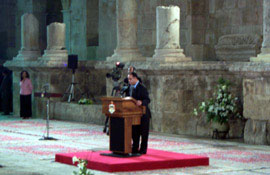 |
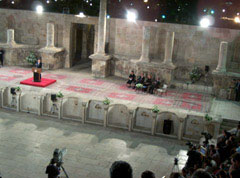 |
Klaus Töpfer,
UNEP Executive Director, said conservation and development must be made
the twin criteria of human progress, and stressed the need to learn
to live off of nature's dividends instead of its capital. Regarding
biodiversity, he noted the serious economic and social costs of its
loss and stressed that the respect for ecological diversity implies
respect for human diversity. |
| Maurice
Strong, Chairman of the Earth Council, overviewed progress since UNCED,
noting that it has not been significant, that the Earth Charter is still
unfinished business, and that the current focus needs to be civil society
and partnerships. He stressed that the role of civil society has increased,
with globalization as a focal point. Regarding poverty eradication,
he remarked that "the poor are preoccupied with their next meal,
the rich with their next deal." |
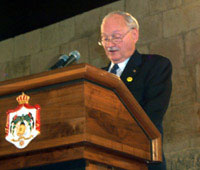 |
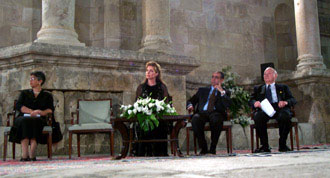 |
Yolanda Kakabadse,
IUCN President (far left), expressed gratitude to Queen Noor for her
dedication to IUCN. She said current environmental devastation is beyond
human comprehension and identified biodiversity loss as the world's
most pressing crisis. She hoped the conference will make a difference
for the Earth. |
| Queen
Noor noted that although IUCN has been effective at the grassroots,
national and international levels, regional issues have been neglected.
She stressed that environmental security cannot exist without peaceful
cooperation between States, and that environmental protection is a pre-requisite
for socioeconomic security. She proposed that Arabic be adopted as one
of IUCN's official languages and urged all religions to unite through
their mutual respect for nature. Part one Part two |
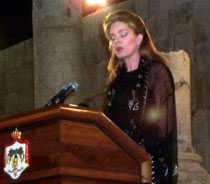 |
|
EARTH FORUM |
|
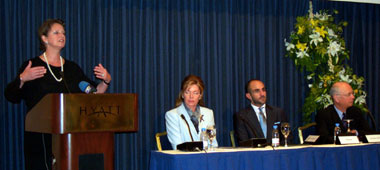 |
Maritta Koch-Weser, Director-General of IUCN, welcomed participants, including representatives of the Jordanian Royal Family. She emphasized the importance of expanding dialogue beyond the inner environment circle and suggested future Earth Forums be held on the margins of climate change or biodiversity convention meetings with private sector, civil society and scientific representatives. |
| Prince Talal Ibn Mohammad read a letter on behalf of King Abdullah II, which noted Jordan's environmental commitment as an essential component of building a culture of peace. | 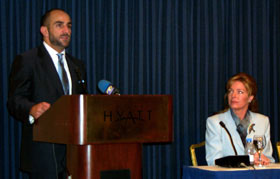 |
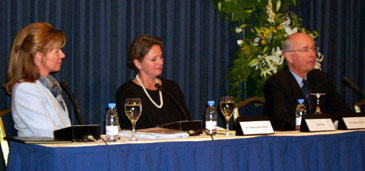 |
Klaus Schwab, President, World Economic Forum (far right), stressed that the Earth Forum's thematic sessions were designed with an integrated approach in terms of stakeholders, geography and systems. |
| View of the ballroom at the Amman Hyatt during the opening of the Earth Forum | 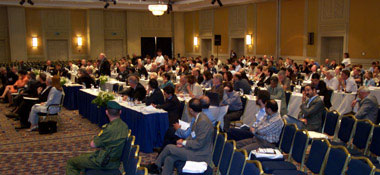 |
| PANEL 1 : IS SUSTAINABLE DEVELOPMENT SUSTAINABLE? | |
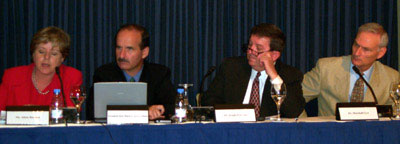 |
From left to right: Alicia Barcena, Director of ECLAC; José Maria Figueres Olson, former President of Costa Rica; Ralph Petersen, CEO, CH2Mhill; and Marshall Gysi, Managing Director, International Federation of Consulting Engineers. |
|
José Maria Figueres Olson, former President of Costa Rica (left),
called for a change in development trends and for encouraging sustainability-oriented
business. He supported the creation of international development indicators
and the implementation of "bio-literacy" among new generations. |
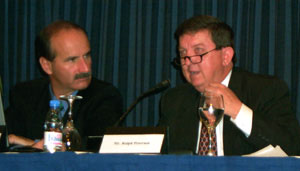 |
| PANEL 2 : CIVIL SOCIETY: "LOYAL" OPPOSITION OR PARTNERS IN GOVERNANCE? | |
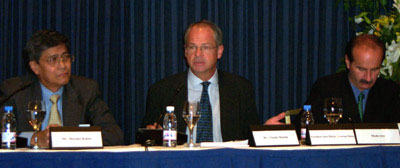 From
left to right:
Maximo Kalaw, Executive Director, National Council for Sustainable Development
Programme; Claude Martin, Director General, WWF International; and panel
moderator José Maria Figueres Olson. From
left to right:
Maximo Kalaw, Executive Director, National Council for Sustainable Development
Programme; Claude Martin, Director General, WWF International; and panel
moderator José Maria Figueres Olson.Martin said civil society represents many agendas and noted issues regarding NGO accountability. He urged greater media involvement to divert attention from demonstrations to the substance of the debates. He commended cross-sectoral partnerships, such as the Forest Stewardship Council. |
|
| Left:
Elizabeth Odio, Vice President of Costa Rica. Yolanda Kakabadse
(right), President of IUCN, remarked that during UNCED civil
society was involved to an unprecedented degree. She expressed confusion
about demonstrations in Seattle and Prague where she saw the interests
of environmental NGOs being subsumed by those of other groups. |
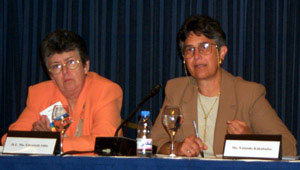 |
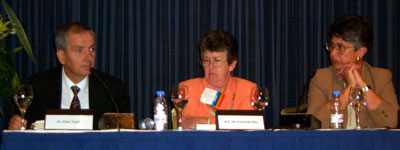 |
Klaus Töpfer, UNEP Executive Director (left), said civil society is not a monolithic block. He underscored fighting the negative effects of globalization to maintain cultural diversity and within the context of society. He said the poor must be given the opportunity to organize and voice their interests, and underscored the importance of land tenure and democratically elected decision makers. |
| HIGH-LEVEL LUNCHEON | |
| Queen Noor spoke to VIPs over lunch, announcing the formation of the Friends of IUCN group. Several of the prominent figures at the luncheon, which included heads of delegations and heads of convention secretariats, were invited to join the new group. | 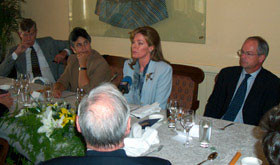 |
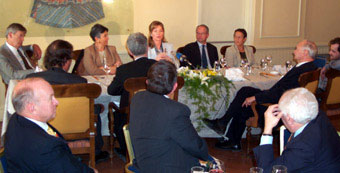 |
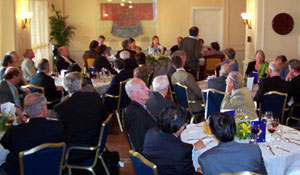 |
| PANEL 3 : EMERGING ENVIRONMENTAL CONFLICTS: HOW DO WE DEAL WITH THEM? | |
|
|
 |
Richard Matthew,
Assistant Professor of International and Environmental Politics, University
of California at Irvine (center), highlighted environmental
stress and resultant social impacts, including increased vulnerability
to natural disasters and violent conflicts. He remarked that exposure
to severe environmental stress corresponds to levels of industrialization
and noted that early warning systems require prohibitive quantities
of data. |
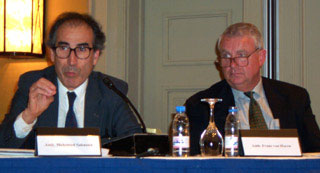 |
Mohamed Sahnoun, Special Advisor to the UN Secretary-General (left) and Frans van Haren, Ambassador of the Netherlands to Brazil. |
| Earth Forum participants during a show of hands | 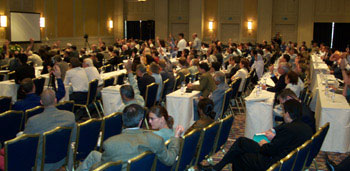 |
| PANEL 4 : CAN WE AFFORD THE FUTURE? | |
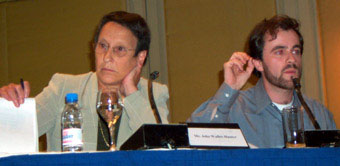 |
On the left:
Joke Waller-Hunter, Environment Directorate, OECD. On the right:
Joe Firmage, Chairman & CEO, Project Voyager, described the rapid developments
in Silicon Valley and called for a "reprogramming" of the
economic machine. He questioned why the free market can attribute US$50
billion to Yahoo, an Internet search engine, based on the anticipation
of future value, but is unable to anticipate the future value of a productive
society in Africa. He noted that taxation of natural resources may reduce
consumption, but could limit access only to the wealthy. |
| Timothy Wirth, President of the United Nations Foundation and Jose Goldemberg, University of São Paulo | 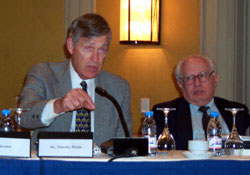 |
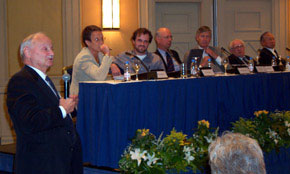 |
Maurice Strong, Earth Council Chairman, thanked participants for their input and said the Earth Forum was designed as a "town hall" of the global village to open dialogue on big questions but not to exhaustively examine all issues. |


